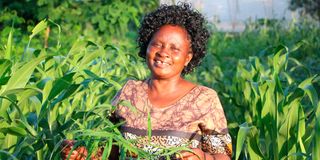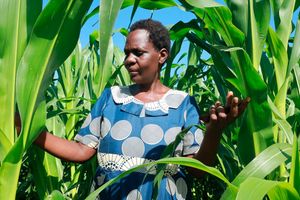Makueni farmer tilling uniquely hailed at climate conference

Phoebe Mwangangi tends to her sorghum crop in Ngukuni Village, Makueni County on December 18, 2023. The rain water and soil conservation champion addressed the COP28 forum last year.
What you need to know:
- How she grows her crops sets her apart from other farmers.
- Instead of tilling the farmland using a disc plough, Ms Mwangangi has joined a growing number of farmers who go for ripping.
- This entails opening up the soil for planting purposes using a chisel plough to break the hard pan, a hard surface which forms below the uppermost soil layer out of continuous compaction through conventional tillage.
A giant pond covered in greenery greets visitors entering Phoebe Mwangangi’s homestead near Makindu in Makueni County. As everyone else takes cover whenever it rains, the farmer dashes the opposite direction to fix a channel that directs surface runoff into the pond lined with concrete. The pond, which collects millions of litres of water during the rainy season, sits at the heart of an elaborate irrigation system.
It is Ms Mwangangi’s household lifeline during the dry season. She is among the biggest suppliers of fish, green maize and fresh vegetables in the region, which is prone to drought.
“We seed the pond with thousands of fingerlings during the onset of the short rainy season and harvest mature fish weighing up to a kilo in August when the volume of water reduces,” Ms Mwangangi tells Healthy Nation.
She says the fish feed mainly on Azolla, the protein rich fern covering the pond with greenery, one which is harvested regularly.
When it rains heavily, she directs the excess water into terraces that line the farmland. Touring the six-acre farmland reveals why a World Bank funded programme on promoting the uptake of climate smart technologies in Africa picked the trained veterinary doctor to showcase her approach to farming at the 28th Conference of Parties (COP28).
Ms Mwangangi is a mixed farmer. She stands out in many ways. Instead of keeping many heads of cattle, which her farmland cannot sustain, for instance, she keeps one dairy cow, a friesian, whose milk production meets the needs of her family. In a region dominated by maize as the staple food, Ms Mwangangi grows drought-tolerant crops — sorghum, millet, green grams, high iron beans, cassava and pigeon peas.
How she grows her crops sets her apart from other farmers.
Instead of tilling the farmland using a disc plough, Ms Mwangangi has joined a growing number of farmers who go for ripping. This entails opening up the soil for planting purposes using a chisel plough to break the hard pan, a hard surface which forms below the uppermost soil layer out of continuous compaction through conventional tillage.
She also uses zai pits to grow assorted crops. Instead of burning crop residue, she puts it to use as mulch. She uses herbicides instead of weeding. These climate smart technologies, she says, have guaranteed high yields in the wake of drought by enabling the soil to retain moisture for long while guaranteeing minimum soil disturbance.
“When the country was on the throes of a prolonged drought a year ago, this region received 104 millilitres of rainfall cumulatively in one of the rainy seasons. This is not enough to support the production of conventional crops such as maize. But I produced more food than we needed at home. We sold the surplus,” she says.
Ms Mwangangi used the biggest global gathering on tackling climate change to drum up support for communal approach to soil and water conservation as she called on the government and other development organisations to put farmers at the centre of conversations on soil and water conservation. She strongly believes this is a panacea to food poverty.
“Soil health is the basis of our farming systems,” she says, echoing the closing remarks in one of her presentations during the COP28 conference in the United Arab Emirates last month.
“As a farmer, the soil will dictate the kind of farming I’ll do, the kind of produce I’ll get, its quantity and the quality. With climate change and soil erosion, soil health is degrading. The farmer is not getting as much as they used to get. This calls for the uptake of innovations to help increase the soil health and the farm’s production,” she notes.
She uses the farmland to diffuse the climate smart solutions into the region and beyond. “We meet regularly in farmer groups to talk about rain water harvesting, soil fertility, deep tillage and minimum soil disturbance and what they portend for us as smallholder farmers,” she says.
Although these technologies are tried and tested, experts decry low uptake especially among smallholder farmers. In a bid to address this, Accelerating Impacts of CGIAR Climate Research for Africa (AICCRA), a World Bank-funded project, is promoting the uptake of climate smart technologies, which are churned by scientists under the Consultative Group on International Agriculture Research (CGAIR).
They tap into lived experiences of smallholder farmers exposed to the vagaries of climate change to make a strong case for the need for aggressive promotion of the uptake of climate smart technologies among smallholder farmers.
AICCRA seeks to address the problem majorly by bridging the gap between scientists and smallholder farmers in Africa. “At the onset of the project three years ago, we planned to reach 1.5 million smallholder farmers in Africa with these climate smart agricultural solutions. By now we have reached five million such farmers,” Anne Maria Loboguerrero, a director at AICCRA, told a breakaway session attended by Ms Mwangangi during the COP28 forum.
She stressed the important role played by champion farmers such as Ms Mwangangi in accelerating the uptake of climate smart agriculture solutions, which she said are key in building resilience to the vagaries of climate change.





